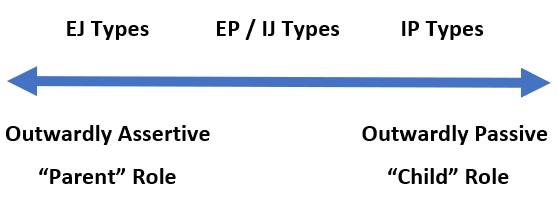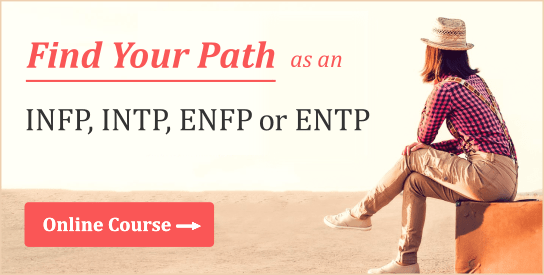
The human mind is an incredibly flexible and adaptable instrument, capable of operating in a number of different modes in order to optimize results under a variety of circumstances. Jung’s eight functions (Ti, Fi, Ne…), for example, are a testament to the array of mental faculties at our disposal.
Two of the most prevalent psychological modes, or what might be better described as roles, are those of “parent” and “child.” While we often think of parent-child roles as being fixed or biological, in reality we can all play either role and will readily switch between them if called for by the social circumstance.
It’s not unusual, for instance, to observe children parenting their dolls or pets. Nor is it hard to find parents who, for one reason or another, behave like children. Clearly, parent-child roles go well beyond biology and are more like scripts that we can voluntarily enact.
Furthermore, we must recognize that there are at least two varieties of the parent role, which we will refer to as the “Authoritative” and “Supportive” roles. There are also a couple of child roles—the “Autonomous” child and the “Compliant” child. Here’s a quick overview of each:
Parent Roles
The “Authoritative” Parent
- Strong, assertive, dogmatic, hierarchical
- Identifies and promotes “appropriate” attitudes / behaviors
- Establishes clear rules and consequences
- Basic belief: “I know what’s best for you.”
The “Supportive” Parent
- Soft, nurturing, egalitarian
- Aims to support and foster child’s unique developmental path
- Suspects that excessive rules and strictures may hinder rather than promote healthy development
- Basic belief: “I want to help and support your natural development as an individual.”
Child Roles
The “Autonomous” Child
- Strong-willed, stubborn, unfettered, potentially rebellious
- Basic belief: “I know what’s best for me.”
The “Compliant” Child
- Adaptable, subservient, pleasing
- Basic belief: “You know what’s best for me. I want to please and follow you.”
While acknowledging that there are different versions of the parent and child roles, in this post, we will understand the parent role exclusively in the Authoritative sense. Doing so not only sharpens the conceptual contrast between the parent and child roles, but will also give us a clearer picture of how these roles overlap and interface with the Myers-Briggs personality types.
Personality Type & Parent-Child Roles
As I’ve discussed elsewhere, extraverted (E) and judging (J) types tend to be more assertive than introverts (I) and perceivers (P). Judgers are also more likely to endorse a single correct way of doing things and thus desire that others understand and embrace their perspectives. Moreover, because their primary judging function is extraverted in nature (i.e., Te or Fe), J types can generally be seen as imposing structure on the outside world. Therefore, judgers, especially EJ types (ESTJ, ENTJ, ESFJ, ENFJ), are more apt to assume the parent role (again, in the Authoritative sense).
As discussed in my book, The 16 Personality Types, introverted (I) and perceiving (P) types (i.e., IPs) are more outwardly passive and adaptive in their approach to the outside world. Instead of trying to shape or control the outside world, IPs modify their own attitudes and behaviors in ways that allow them to tolerate, avoid, or blend with others. They are thus inclined to exhibit some combination of the Autonomous and Compliant child roles.
In sum, EJs gravitate to the Authoritative parent role and IPs to the child roles. EP and IJ types can more readily adopt either role, depending on the circumstance. Although these role designations are by no means set in stone, our personality type does make us more comfortable playing some roles than others.

While it may seem a bit counterintuitive, we shouldn’t assume that those playing the parent role are somehow more psychologically mature or developed than those in the child role. Once we understand that the parent role is associated with certain functions (Fe & Te) and the child role with other functions (Fi & Ti), we can see the error in assuming, for instance, that an ENFJ, by virtue of using Fe and playing the parent role, is somehow more mature than an INFP utilizing Fi and enacting the child role. As we will soon discuss, true psychological maturity requires competence in either role, as well as an ability to integrate and transcend them.
Parent-Child Roles in Romantic Relationships
The particular roles we play are always relative to our social context. For example, if someone has already strongly established herself in the parent role, we will typically fall into the child role. This is not unlike the dominance hierarchies seen in animals where there can be only one alpha leader.
We know that romantic relationships are often composed of a more dominant and submissive partner. This dominance disparity not only contributes to sexual attraction, but also to the balance and stability of the relationship. This helps us understand why so many couples have historically adopted, wittingly or not, the dominant-submissive / parent-child relational structure. It’s also why extraverts commonly pair with introverts, judgers with perceivers, etc. There is clearly some validity to the “opposites attract” notion, and Jungian psychology tells us why. Namely, the traits we are drawn to in our psychological opposite are the very characteristics that are repressed or underdeveloped in ourselves. Psychologically, we sense that our opposite can help us rediscover what we’ve repressed and, in turn, feel more whole and balanced.
Gender and biology also influence the partners we select and the roles we play, with hormones such as testosterone promoting dominance and status-seeking behavior. This leads to some interesting questions, which we unfortunately can’t pursue here, such as what happens when our gender and personality type point in conflicting directions with respect to the roles we should assume.
For now, we will confine our focus to examining which personality types are more likely to assume the parent versus child role in a relationship. Referring back to our earlier diagram, we can make the following predictions regarding the expected parent-child roles for various type pairings:
Relational Roles of the Types
EJ (parent role) – IJ (child role)
EJ (parent role) – IP (child role)
EJ (parent role) – EP (child role)
EP (parent role) – IP (child role)
IJ (parent role) – IP (child role)
EP (?) – IJ (?)
As we discussed earlier, there is certain magnetism and stability to the parent-child dynamic, which is why many couples fall into these roles in the first place. However, it’s also not uncommon for one or both partners to start feeling resentful or unsatisfied with the role they’ve been playing.
Those accustomed to the child role, for instance, may at some point conclude that they don’t feel respected or treated as an equal in the relationship. When this occurs, they may start exhibiting fewer Compliant behaviors and more Autonomous ones. And while the Autonomous role is technically still a child role, it is less compatible with the Authoritative parent role and can thus have a destabilizing effect on the relationship. Partners assuming the Autonomous role often exhibit passive-aggressive behavior, which Wikipedia describes as:
A pattern of indirect resistance to the demands or requests of others and an avoidance of direct confrontation…a habitual pattern of…opposition, sullenness, stubbornness, and negative attitudes in response to expectations.
While P-A behavior is more passive than direct forms of resistance or confrontation, it is still aggressive and therefore at odds with the Authoritative parent role, which is also characteristically aggressive.
As discussed in our post, Relationship Challenges for INFPs, INTPs, ISFPs & ISTPs, P-A behavior is common among IP types. This can stem from a fear of confrontation (e.g., of being hurt, rejected, punished, etc.), a desire for autonomy, as well as a distaste for external authority (“Only I know what’s best for me.”). While IPs often feel rather powerless with respect to the outside world, P-A behavior, regardless of its downsides, may help them maintain a sense personal power and autonomy.
If a passive-aggressive IP pairs with an EJ who employs the “I know what’s best for you” approach, things are bound to get ugly rather quickly. Well-versed in the parent role, EJs are used to feeling socially powerful and having their way with others. So when an IP starts dodging or passively resisting their authority, EJs will find it frustrating, even threatening. After all, the EJ’s sense of self-worth and self-confidence is largely dependent on the compliance of others. Consequently, when faced with a defiant partner, EJs will often redouble their parental efforts in hopes of reclaiming their seat of power and authority.
A Third Role: The Integrated Individual
For those called to personal growth, neither the parent nor the child role is apt to prove fully satisfying in the long run. Ultimately, integrating individuals want to acquire competence in both roles and then learn how to integrate and transcend them. The idea is to have a diverse portfolio of role competencies, along with the discernment to know when and where a particular role is called for.
With regard to type, EJs must develop and integrate their Ti / Fi child role capacities. Doing so will help them feel more self-assured, which means they no longer need to constantly parent others to feel whole and powerful. Integrating EJs learn to find value and strength in themselves, even when they’re alone.
Similarly, integrating IPs must develop competence in Fe / Te roles, including becoming more open to, and skilled with, direct forms of communication. Moreover, instead of merely capitulating or avoiding confrontation, they start seeing conflict as an opportunity to grow and stretch themselves.
Of course, all of this requires the ability to keep our ego in check. As soon as the ego gets involved, little of lasting value will be accomplished. Thus, if one or both individuals in a relationship consistently exhibit ego issues, progress will prove difficult. Moreover, because ego issues are often tied up in the inferior function, IPs are actually most at risk when they flip into the parent role (e.g., deploying Fe or Te in an angry or condescending manner) and EJs the child role (e.g., arrogant or selfish displays of Ti or Fi).
If you’re an intuitive (N) perceiving (P) type and would like to better understand your personality, relationships, life path and more, be sure to explore our online course, Finding Your Path as an INFP, INTP, ENFP or ENTP.
Related Resources:
Relationship Challenges for INFPs, INTPs, ISFPs & ISTPs
Childish vs. Mature Love & Relationships
books: My True Type | The INTP | The 16 Personality Types

Nann says
Very elegant article. This correlates with what I have observed in reality and in my experience as well.
A lot of my IPs acquaintances have paired with EJs in their late 20s/early 30s, but because both were so used to navigating the world (at leisure and at work) through their Dom function, they quickly clashed and became resentful about being “crossed” and confined to a certain role. A lot of them quickly parted ways, yet still chose a different flavour of IP/EJ later on (ISTP going for ESTJ after an EFJ and INFP pursuing ENJ after ESJ, etc.).
I find that IJ and EP are a lot more flexible in their relationships and, for this reason, they tend to pair with each other fairly steadily. Very rarely I have come across IP-IJ pairings or EP-EJ couples that weren’t either completely dysfunctional or just living completely separate lives. I have seen some ISJ-ISJ pairs among young teenagers, but not so much in adulthood.
Strange as it seems, I have heard of a few INJ-INJ pairs coming together often, while ENP-ENP or INP/INP is much less common. It might be that the rarity of the Dom function plays a strong role in how people approach their relationships with people of the same or similar type.
Emily Davidson says
It appears, from my experience, there can be great difficulty in trying to maintain relationships with two IP types, in which neither partner is well equipped in handling the parenting role. It seems that this engenders a lack of respect and sense of purpose to a relationship; a moored ship without a captain to lead it. Even if both parties were fully able to somewhat integrate parental roles, it seems as though such a dynamic is still potentially lacking in structure. What would a healthy role integration even look like?
Tiggy Sagar says
In my experience, the IJ will assume a more adult role in relation to an EP.
Jo says
I like the comment ‘Nann’ made around the IJ and EP pairing being ‘steady’. I think that the EP and IJ types definitely can adopt either role, my husband is an ISTJ and I’m an ENFP – a lot of articles suggest this is not an ideal pairing, but after 14 years it still feels ‘natural’ and ‘balanced’. He more often assumes the ‘parent’ role for ‘Si/Te’ related matters and I tend to take the parent role when it is time to consider different perspectives and moral matters (i.e., the Ne/Fi matters). I love that I neither have to be the ‘parent’ all the time (like I had to in past relationships with IP type – I really loathe passive-aggressive behaviour) or always submit to the child role.
If I had to choose, he is – I concede – more often the ‘parent’ than me! :-)
Flora says
Eye-opening article. I’ve just had an a-ha moment why I was struggling in my last relationship. I’m an INFJ and although I was shy and anxious among others until my 20s (being in a compliant child role), years of traveling and living abroad taught me a lot about myself and people in general. I feel naturally leaning towards the supportive parent role now. My ex is an INFP and his autonomous child mode gave me a really hard time. Although he didn’t communicate his needs directly, I picked up the cues and reacted to them without words, as a simple example, not staying late when he didn’t want me to. I asked him from time to time about them and he was surprised that I knew about them without him telling me. I made several efforts to make a safe environment to share his ideas and feelings, and we talked about it many times, but he stayed with his passive-aggressive ways. It was hard for me to accept, as I value openness and honesty. Apart from that, I still prefer being in a compliant child role when it comes to relationships. I learnt how to manage in parent mode, as I find it more effective in many situations in life, but I feel that there might have been some disharmony on that side too.
Judi says
How do you know if you are a ENFP or an INFP, I have scored both on Brigg Myers test. I’m personality junkie I am always an INFP. I’m confused about this??